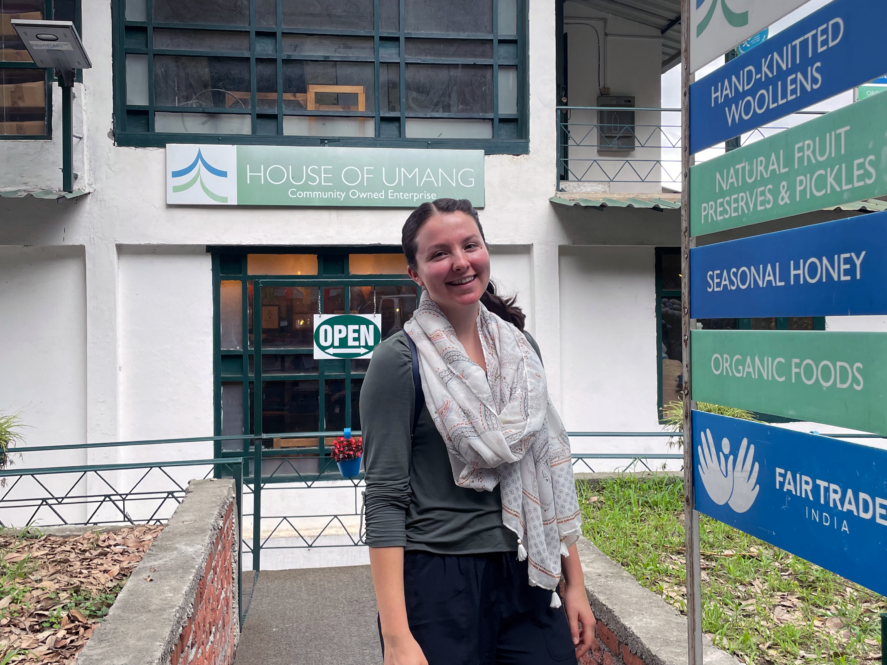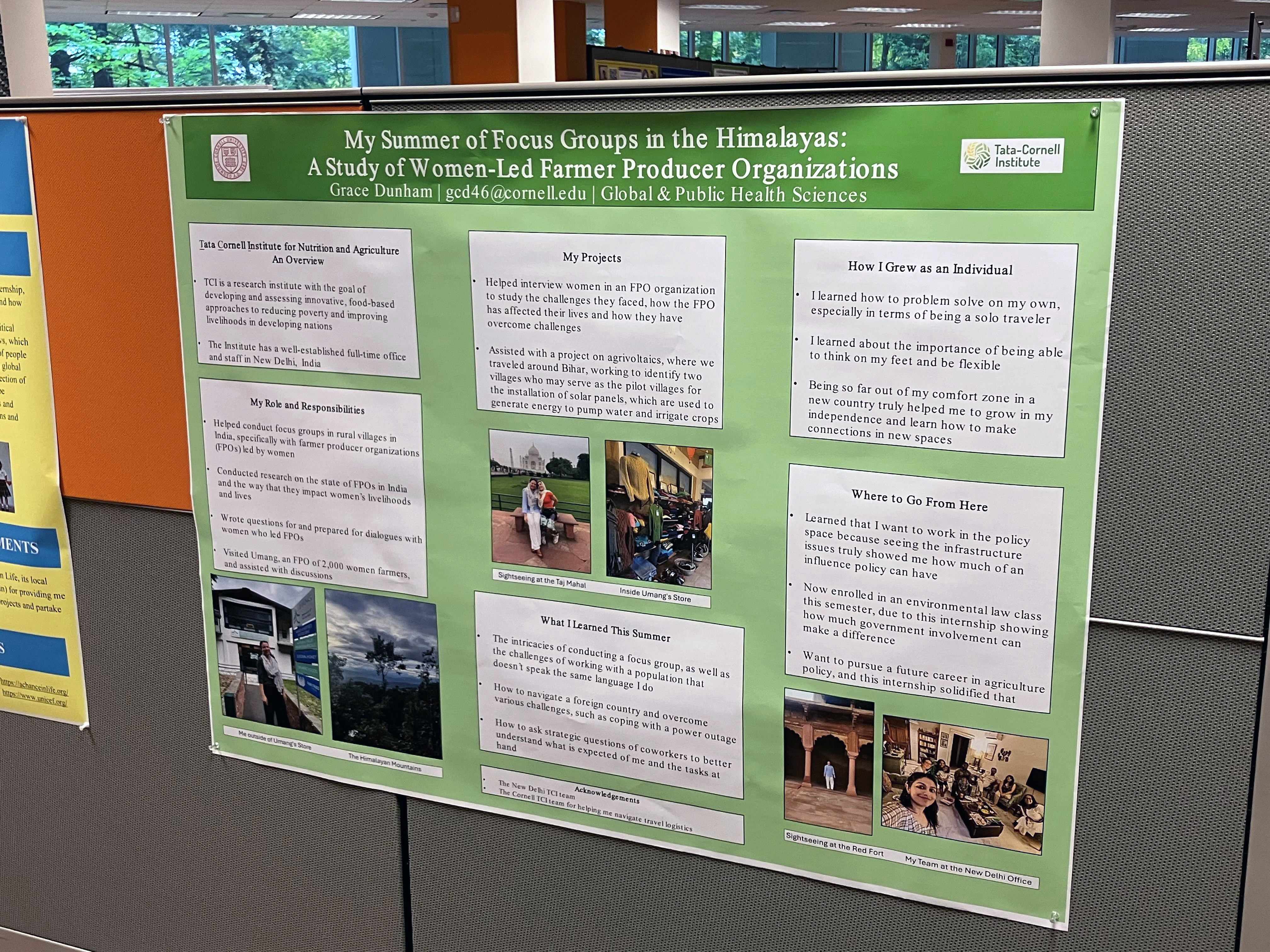From Self-Help Groups to Value-Added Business: My Experience with Umang

It was the middle of July, and I sat on a concrete floor covered in woven carpet, joined by many women wearing brightly colored saris. Each woman was a member of a farmer producer organization (FPO) called the Mahila Umang Producers Company, or Umang. Umang is a women-only business selling jams, knit sweaters, and other quality goods. There on the ground, we chatted about the significance of monthly meetings while snacking on fresh bananas and puffed millet snacks. Dr. Pallavi Rajkhowa and I had traveled to the Himalayan town of Ranikhet via plane and a twisting five-hour cab ride to learn more about the women of Umang and their stories. We wanted to better understand the ways that FPOs can empower women to provide for themselves and their families. We wanted to learn all we could about the things they had done well, their challenges and how they had overcome issues in order to inform the formation of future organizations like theirs. Over three days, we held focus group discussions with the group’s leaders and toured its store and processing facilities. I came away with a better understanding of all that Umang had accomplished, as well as the challenges it faced.
Umang is in the Indian state of Uttarakhand, where over 70% of the population relies on agriculture for their livelihood. In Uttarakhand, agriculture contributes 23.5% of the state’s GDP, compared to 15% in all of India. In Uttarakhand and across India, women play a large role in agriculture. In a recent study of women in Uttarakhand, women farmers were described as the backbone of the agricultural workforce. A phenomenon called the “feminization of agriculture” has taken place, with men migrating to urban areas, increasing the burden on women to cultivate agricultural land in addition to tending to housework. This was reflected in discussions with Umang members, some of whom said their husbands moved to Delhi and became unreachable.
In the face of this migration, Umang membership seemed to be a source of stability and resilience. Women reported that Umang allows for bargaining power so that members can receive a good price for their produce and products. Members also receive free transportation of their products, helping to boost revenue and mitigate their supply chain costs. Members are also provided with loans at a lowered interest rate of 1% per month (12% per year). These loans are generally used for things like education of family members, housing improvements, and other human development purposes. If a woman is unable to pay on time, then the loan is restructured to allow more flexibility.
In one personal story, a woman reported that Umang loans had allowed her to educate her children and build her house. Since then, she said that she has taught over 200 women how to knit, truly a testimony to the “give-back,” collaborative nature of Umang.

A poster Grace Dunham made about her internship was displayed at the College of Agriculture and Life Sciences’ Engaged & Experiential Learning Symposium. (Photo by Terry Mingle/TCI)
This is how Umang works, with board members learning certain skills and then training a set of self-help group (SHG) leaders, who then train their members. In addition to many economic benefits, Umang offers social benefits to its members. Women can be chosen as the SHG leader, helping them to learn life skills about leadership and managing responsibilities. These leaders can be elected as Umang board members, so there is room to grow within the organization.
However, when asked about the challenges faced by Umang and its members, one issue the women mentioned was a lack of progression to the next generation. Umang is about 15 years old, so it is nearing the time for new leadership and growth, as a new generation will be taking on more responsibilities. Interviews revealed that the older women would like to be in Umang for life, thus reducing the opportunities available for younger women, as the SHGs are capped at 15-20 members. This issue has complicated capacity building within Umang, as many of the women have established themselves and no longer need the financial support that the group grants.
There are also external challenges, including the increasing burden of climate change. The warming climate has lowered crop production capacity, leading some women to migrate to cities to find work. Members said that, due to rising temperatures, the area was becoming unfit to produce some of the crops they have always grown, such as apples.
Another challenge is marketing the goods produced by Umang. The company has a wide plethora of products and is actively working to create new ones. However, there is a lack of growth in distribution and marketing. There is unrealized potential in the marketing tactics and market access that Umang could use.
There are strategies to help mitigate these challenges. One strategy includes adding a formalized leadership development initiative, pairing new members with a senior board member or SHG leader to facilitate mentorship and the transfer of roles. Another is the introduction of a temporary marketing lead and consultant to allow for fresh ideas and efforts to expand market reach and profits. Steps in this direction seem to be happening, as Umang has tasked a student intern with building their social media presence, bringing fresh content to their Instagram.
In terms of mitigating the effects of climate change, Umang could consider partnering with a financial services organization to insure their crops. This would lower the degree of unpredictability that has increasingly been synonymous with agriculture.
It’s clear that Umang has accomplished great things for its members and its community. Despite this, there is also untapped potential for continued growth and development. This is especially true during a crucial point in the organization’s life, when its current leadership is transitioning out. I’m grateful for the opportunity to get to know these women and share parts of our lives with each other.
Grace Catherine Dunham was a TCI intern with the CALS Global Fellows Program in the summer of 2024. She is a global and public health sciences major in the College of Agriculture and Life Sciences at Cornell University.
Featured image: Grace Catherine Dunham stands outside the House of Umang store in Uttarakhand, India. (Photo provided)

